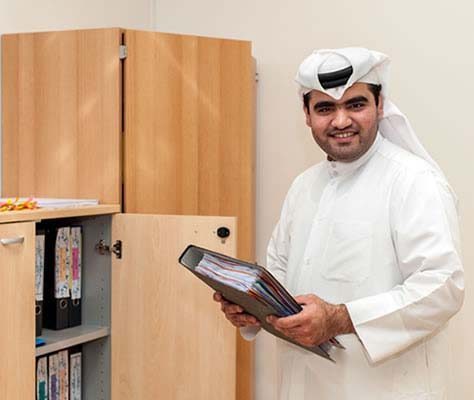
A commitment by one of Qatar’s most high-profile employers to hire 50 residents with intellectual disabilities has officials hoping that other companies will be inspired to launch similar recruitment campaigns.
The Shafallah Center for Children with Special Needs runs a job training program for individuals between the ages of 18 and 27 years old that equips students with social, language and practical workplace skills.
Learning the basics of data entry, filing, mailing, photocopying and reception duties allows them to be matched up with employers.

Since launching some six years ago, the center has matched 44 graduates with employers in government ministries and the private sector, according to Siddiqa Darwish, who heads the job training department.
However, she told Doha News that she hopes to match an additional 100 students in 2015 alone, largely on the strength of a commitment by Qatar Airways, announced today, to hire 50 Shafallah graduates by the end of 2015.
At a press conference today, Qatar Airways CEO Akbar Al Baker said the new hires would be paid at the same rate as other staff members.
“They will be treated exactly as any other employee,” he told reporters.
The law
Under Qatar law, all private sector organizations employing more than 25 people should have at least one person on its workforce with special needs.
While some companies strive to embrace inclusionary hiring practices, others fail comply with this regulation, particularly in sectors like retail, which involve face-to-face interaction with the public.
There are other challenges in bringing more residents with intellectual and physical disabilities into the workforce.
Gaby Salom, the general manager of local furnishings store The One Qatar, recently told Doha News that some people are prevented from joining his company by their families. He explained:
“I think they were afraid of their challenged relative working in a public setting, and they felt shame. But I see working in retail as a great opportunity – you have the chance to change society’s mindset and try to get rid of the stigma that exists around this issue.”
Currently, only a handful of special needs employees work for the national carrier.

Four Shafallah graduates began working at Qatar Airways’ catering department in 2012, according to Nabeela Fakhri, vice-president of human resources employee services. A fifth later joined to assist with office filing.
The relationship between the airline and Shafallah later expanded to include specific projects, in which students prepared the amenity kits distributed to passengers in first and business class, as well as special Ramadan and National Day gifts given to travelers at the airport.
Darwish said the center currently has 145 graduates and students who are currently enrolled in Shafallah’s job training program, which typically runs two to three months.
While not all of them will be matched with an employer, she said she hopes that other companies and government departments take notice of Qatar Airways’ initiative.
“We want (our graduates) to be developing skills by working in the community and dealing with people,” she told Doha News.
Thoughts?







